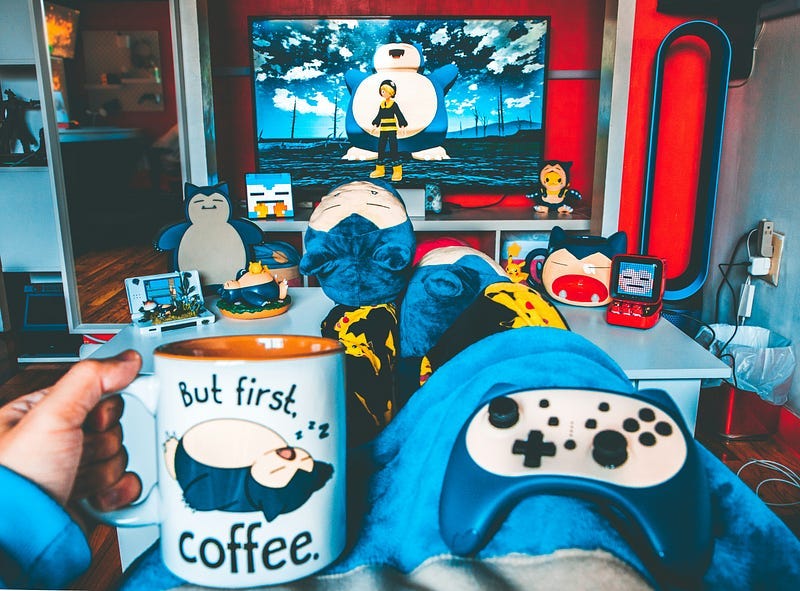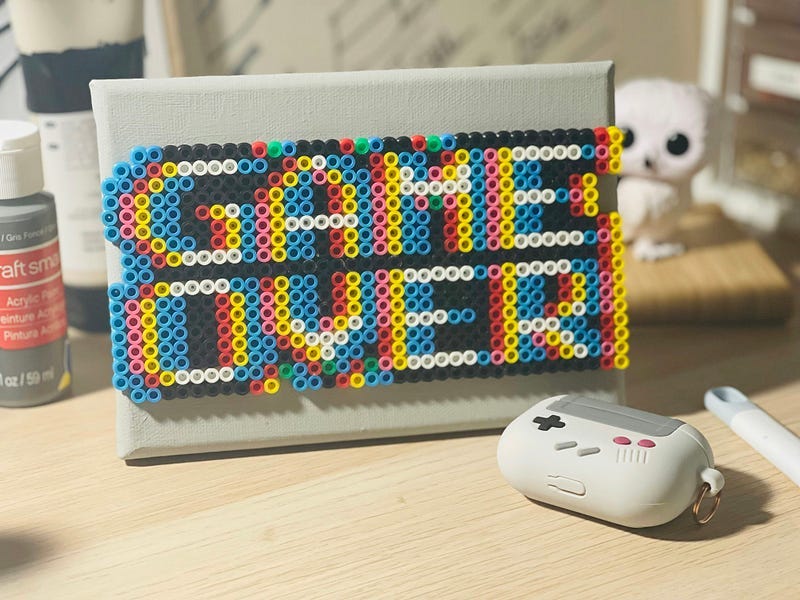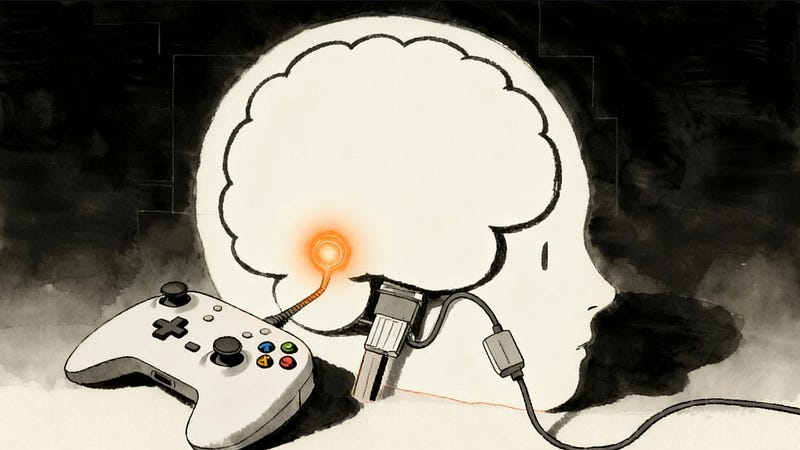Why Video Games Feel So Damn Good?
From dopamine hits and flow states to psychological manipulation, this is the ultimate deep dive into the addictive science of game design.
The clock strikes two in the morning.
The world outside is dead silent, but your face is alive, illuminated by the glow of your monitor. The rational part of your brain that needs to be up for work in a few hours was murdered by the thought, “Just one more game.”
On screen, you just pulled off a perfect penta-kill or finally toppled that boss that’s been tormenting you for three straight nights. The adrenaline rush makes you feel like the king of the world.
We’ve all been there.
Here’s the real question: Why are we more willing to charge into virtual battles than to tackle the “more meaningful” things in our real lives? Like, you know, reading that self-help book or hitting the gym?
Don’t be so quick to label yourself “undisciplined.”
What’s happening is a perfectly engineered “perfect storm” targeting your brain. According to Newzoo, the global games market hit a staggering $184 billion in revenue in 2023, with over 3.3 billion players. You’re not alone in your “addiction”; you’re the target audience for the largest and most profitable entertainment industry on the planet.
So, before we talk about “quitting,” let’s get to the bottom of it: Why are games so damn fun?

Your Joy Has a Price Tag
Ever wonder what happiness actually feels like?
In neuroscience, a huge part of that feeling is a chemical called dopamine. It’s not the pleasure itself, but the engine that drives you to seek pleasure.
Picture it: that beam of golden light when a legendary item drops in Diablo. That crisp “Penta Kill!” announcement in League of Legends. Or just the shimmering gold wish in a Genshin Impact pull.
In that single moment, the dopamine levels in your brain skyrocket. Your reward circuit lights up like a Christmas tree, telling you, “YES! That felt amazing! Do it again. NOW.”
This is the core secret of all great game design: instant feedback.
The real world operates on delayed gratification. You work hard for a month to get a paycheck. You work out for six months to see a tiny change in your body. That long, painful wait is enough to kill most people’s motivation.
But games are different.
Kill one monster, and the XP bar immediately nudges forward. Complete a small quest, and a “Quest Complete” banner flashes with rewards. Many games even have “Daily Login Rewards” — you get a prize just for showing up.
This crystal-clear loop of “effort equals reward” perfectly exploits our brain’s craving for certainty and immediate satisfaction. Real life makes us wait. Games get us high, instantly.
The Magic of Losing Yourself
You know the feeling. Time evaporates. Hours feel like minutes. You forget you’re hungry, you forget your worries, and the entire universe shrinks to you and the screen.
Congratulations, you’ve entered what psychologist Mihaly Csikszentmihalyi calls a “Flow State.”
There’s a golden rule for entering flow: it happens when a task’s difficulty is perfectly matched to your skill level, pushing you just slightly beyond your comfort zone.
Too easy? You get bored. It’s like sending a max-level character to slay beginner slimes.
Too hard? You get anxious. It’s like throwing a new player into a fight with Malenia from Elden Ring with no weapon.
Great games are masters of this balancing act.
Think about the Dark Souls series. It’s infamous for being brutally difficult, yet it gives you a clear path to mastery. Every time you’re defeated, you’ve learned something new — a boss’s attack pattern, a new opening to strike.
When you finally win, the sense of accomplishment is more profound than any easy victory.
On the flip side, games like Animal Crossing or Stardew Valley use thousands of tiny, achievable goals (planting crops, fishing, decorating your house) to keep you in a constant state of relaxed, low-stakes flow.
Through dynamic difficulty, progressive levels, and clear milestones, the game acts like the world’s best coach, always keeping you in that sweet spot where you feel challenged but capable.

Finding Your “Self” in a Virtual World
Psychologists Edward Deci and Richard Ryan’s Self-Determination Theory states that all humans have three innate psychological needs: Autonomy, Competence, and Relatedness.
Coincidentally, games deliver all three in spades.
1. Autonomy: My World, My Rules
In real life, how many choices do we truly have? We’re constantly pushed around by rules, expectations, and KPIs.
But in The Legend of Zelda: Breath of the Wild, you can march straight to the final boss from the very beginning (and probably get obliterated). Or you can spend hundreds of hours just climbing mountains and cooking meals. In Cyberpunk 2077, your choices lead to wildly different outcomes.
This profound sense of freedom makes you feel like the master of your destiny, not just a cog in a machine.
2. Competence: Watch Me Grow
Remember the feeling of being a clueless newbie at your first job? Real-world growth is slow and hard to measure.
But in a game, every ounce of your effort is quantified. XP bars, level-ups, skill trees, gear scores… these constantly ticking numbers are sending you a clear message: You are getting stronger.
This visible, constant sense of improvement is something we desperately crave but rarely get in real life. It creates a perfect feedback loop that drives you to invest more time to become even more powerful.
3. Relatedness: No Bros, No Glory
Humans are social animals. We need to connect, to belong.
Whether it’s your guild raiding together in World of Warcraft, your squad coordinating in Fortnite, or just strangers discussing character builds in a Genshin Impact forum, games provide powerful social platforms.
You share common goals, a common language, and common enemies. These virtual bonds, forged in cooperation and competition, can sometimes feel more genuine and solid than real-world relationships. Leaderboards and ranking systems push this social comparison to the absolute limit.
Games create a perfect utopia: a world where you are free, constantly improving, and surrounded by allies. Who could say no to that?
It’s Not Just Onions Making You Cry
If the mechanics are the skeleton of a game, the story and sensory experience are its heart and soul.
Why do we agonize over the fate of Joel and Ellie in The Last of Us? Why do we lose sleep over Geralt’s choices in The Witcher 3?
Because top-tier game narratives have transcended simple “kill the monster” plots. They explore humanity, love, sacrifice, and betrayal, forcing you to form a deep emotional bond with the characters. You’re no longer just a player; you are the struggling survivor, the monster hunter weighing impossible choices.
That emotional investment translates into a powerful sense of belonging and a lasting memory of that world.
Try playing DOOM on mute. The thrill is cut in half. Mick Gordon’s industrial metal soundtrack is perfectly synced to the rhythm of the carnage, turning violence into a brutal art form.
Similarly, the melancholic art style and ethereal score of Hollow Knight combine to create a hauntingly beautiful and unforgettable underground kingdom.
Music, art, and sound design build an “atmosphere” that pulls you out of your world and into theirs. I can still hum the theme from Super Mario Bros. — it’s not just a tune; it’s the soundtrack to my childhood.

The Hidden Tricks That Hook You
Beyond the grand psychological theories, designers embed countless tiny “hooks” to keep you coming back.
Variable Rewards: This is the slot machine principle. You never know what you’ll get from the next loot box, making the act of opening it incredibly addictive. The uncertainty creates a constant state of anticipation.
Appointment Mechanics: Your stamina recharges every 6 minutes. The special event starts at 8 PM sharp. These mechanics train you to log in frequently, weaving the game into the very fabric of your daily schedule.
Progressive Disclosure: A game never throws all its systems at you at once. It unlocks new features, maps, and gameplay mechanics bit by bit, constantly dangling something new and shiny in front of you to keep you curious and invested.
Final Thoughts
So, let’s go back to the original question. Why are games so fun?
Because they are precision-engineered happiness machines. They hijack your dopamine system with instant rewards, lure you into a flow state with perfect challenges, satisfy your deepest psychological needs for autonomy, competence, and relatedness, wrap you in a blanket of epic story and sound, and then snag you with hundreds of tiny, addictive design details.
They aren’t evil. They’re just incredibly good at understanding human nature.
Understanding all this isn’t meant to make you hate games. It’s meant to give you back the controls. The next time you find yourself stuck in a “one more game” loop, you can consciously tell yourself:
“Ah, that’s the dopamine talking.” “Okay, I’m deep in a flow state right now.” “This timed event is playing on my fear of missing out (FOMO).”
Know it. Understand it. And then you can truly master it. Enjoy the pure joy games have to offer, but don’t forget that the biggest, most complex open-world game of all — real life — is still out there waiting for you to explore.
AI generated some images and helped write the article.



